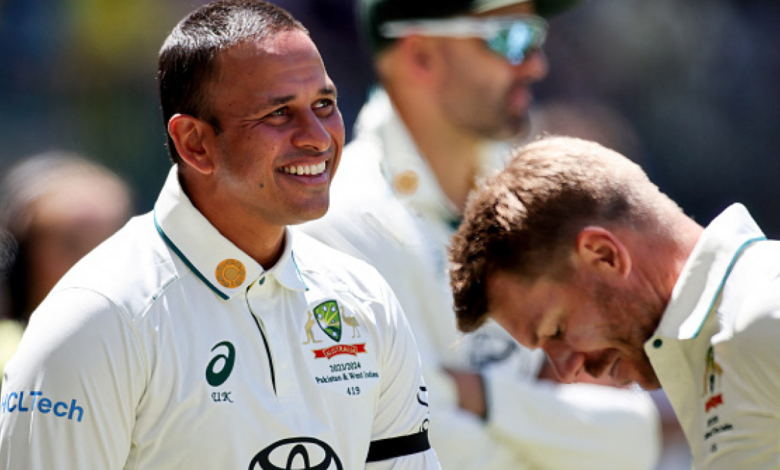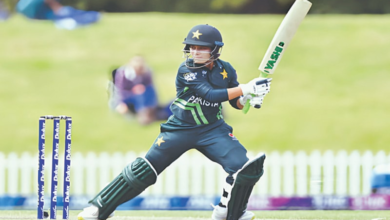Australian cricketer Khawaja wears black armband in Gaza protest

In the world of sports, athletes often find themselves at the intersection of competition and social issues. Recently, Australian cricketer Usman Khawaja made headlines not just for his performance on the field but for a symbolic gesture of protest. Khawaja, during a match, wore a black armband as a form of solidarity with the people of Gaza, drawing attention to the ongoing conflict in the region.

Khawaja’s Statement
Usman Khawaja, a prominent figure in Australian cricket, made a bold choice by using his platform to express solidarity with the people affected by the conflict in Gaza. The black armband, a symbol traditionally associated with mourning, took on a new meaning as Khawaja aimed to bring attention to a humanitarian crisis that often goes overlooked.
The Gaza Protest
To truly understand the weight of Khawaja’s protest, it’s crucial to delve into the situation in Gaza. The region has been marred by conflict, and Khawaja’s gesture serves as a reminder that athletes can be advocates for change beyond the boundaries of the sports arena.
Athletes as Activists
Khawaja joins a long list of athletes who have used their fame to champion social causes. From Muhammad Ali to Colin Kaepernick, athletes have played a pivotal role in sparking conversations and driving societal change. However, this activism is not without its challenges, and Khawaja’s actions raise questions about the role of athletes as activists.
Cricket’s Response
The world of cricket has witnessed varying reactions to Khawaja’s protest. While some applaud his courage in speaking out, others believe that sports and politics should remain separate. The response from cricketing authorities and organizations adds an additional layer to the ongoing debate.
Freedom of Expression in Sports
The incident sparks a broader conversation about the balance between athletes’ rights to express their opinions and the expectations placed on them by sports organizations. As sports become increasingly political, navigating this fine line becomes a challenge for athletes worldwide.
Public Reaction
Social media platforms have been abuzz with discussions surrounding Khawaja’s protest. The public’s reaction provides insight into the diverse opinions on the intersection of sports and political activism, showcasing the power of athletes to influence public discourse.
Khawaja’s Perspective
In his own words, Khawaja sheds light on his motivations behind the protest. His perspective adds depth to the discussion, revealing a personal commitment to using his platform for issues he believes in.
Criticism and Support
As with any act of protest, Khawaja’s actions have not been without criticism. Some argue that sports should be a neutral ground, while others commend his courage in taking a stand. Balancing these contrasting viewpoints is essential for a nuanced understanding of the situation.
Athletes’ Responsibilities
Being a public figure comes with responsibilities, and athletes are not exempt from societal expectations. The ethical considerations of expressing political views, especially on a global stage, pose challenges for athletes navigating their roles as influencers.
Global Athlete Activism
Khawaja’s protest is not an isolated incident. Athletes worldwide are increasingly using their platform to address global issues. This trend emphasizes the interconnectedness of sports and societal challenges, transcending borders and cultures.
Impact on Cricket Culture
The question arises: will Khawaja’s protest influence other cricketers? The incident prompts a reflection on the culture within the sport and how individual actions can contribute to shaping its future trajectory.
Role of Sports in Social Change
Historically, sports have been a catalyst for social change. From Jesse Owens at the 1936 Olympics to modern-day movements, athletes have played a pivotal role in driving progress. Khawaja’s protest continues this legacy, highlighting the potential of sports to influence broader societal conversations.
The Future of Athlete Activism
As the landscape of athlete activism evolves, it raises questions about how sports organizations will adapt. Will they embrace the changing dynamics, or will there be resistance to athletes using their platform for more than just the game?
Conclusion
In conclusion, Usman Khawaja’s decision to wear a black armband in protest during a cricket match has sparked conversations that extend beyond the boundaries of the sports field. It underscores the power athletes hold in shaping narratives and advocating for social change. The incident invites us to consider the responsibilities of athletes, the evolving role of sports in societal issues, and the fine line between expression and expectation.





